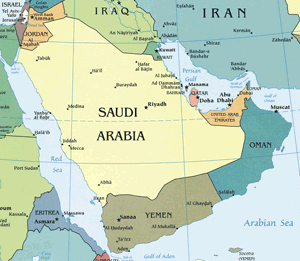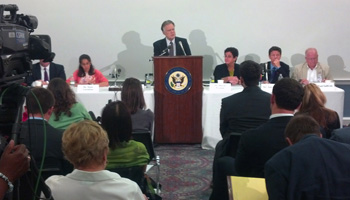Statement from Dr. John Duke Anthony, Founding President and CEO, National Council on U.S.-Arab Relations; Member, Secretary of State Kerry’s Advisory Committee on International Economic Policy and its Subcommittee on Sanctions; and Adjunct Professor, Defense Institute of Security Assistance Management; on occasion of the C3 Summit 2013 in New York.
Wael Fakharany, Ransel Potter, and other distinguished speakers and guests, I am honored to have been asked once again to address you at this second annual C3 Summit in New York. I am also pleased to be asked to identify an opportunity largely overlooked by the rest of the world and especially by many in the United States that will continue to have an extraordinary impact on global affairs. Such an opportunity is the little known but growing and increasingly formalized American relationship with the six Gulf Cooperation Council (GCC) member-countries of Bahrain, Kuwait, Oman, Qatar, Saudi Arabia, and the United Arab Emirates.

Arabian Peninsula
The GCC and its members arguably represented such an opportunity from the beginning of its establishment in May 1981. Certainly, the region they inhabit then as now is the one area more than any other on the planet to which the United States has mobilized, deployed, and led an internationally concerted coalition of the world’s armed forces three times in the last quarter century.
Even so, and despite the GCC countries wishing it were otherwise from the outset, and despite also the European Union (EU) and its member countries taking advantage of the opportunity practically from the beginning, often at America’s expense despite the latter’s economic and strategic comparative advantage, the United States mainly failed to do so.
Instead, for reasons arguably anchored in the deep-rooted and pervasive American negative stereotypes of Arabs and Muslims, and an undeclared suspicion of the potentially controversial use to which the extraordinary resources of such a collectivity might one day be put, one set of American Executive and Legislative Branch leaders after another paid little heed to the Riyadh-based GCC General Secretariat. Neither did Washington officialdom take seriously or respond credibly and respectfully to the members’ various overtures to try and place their relationship with world’s strongest power, and vice versa, on the firmest foundation possible.
Now, however, this has largely changed. At least on the economic and strategic fronts as they relate to America’s and the GCC’s respective quests for greater regional and global security and stability, and the respective potential for increased prosperity at both ends of the relationship, there is the end of an error and the beginning of an era quite unlike any before.
Continue reading »
 The National Council on U.S.-Arab Relations is pleased to provide the twenty-first edition of the Council Chronicle, the Council’s periodic newsletter. The Chronicle seeks to keep the Council’s alumni, donors, and other supporters informed and updated. One among other efforts to do so on an ongoing basis is achieved by presenting highlights and special reports on the Council’s programs, events, and activities. For new readers interested in learning more about the Council’s vision and mission, together with the ways and means it utilizes to pursue both objectives, please visit the Council’s website at ncusar.org.
The National Council on U.S.-Arab Relations is pleased to provide the twenty-first edition of the Council Chronicle, the Council’s periodic newsletter. The Chronicle seeks to keep the Council’s alumni, donors, and other supporters informed and updated. One among other efforts to do so on an ongoing basis is achieved by presenting highlights and special reports on the Council’s programs, events, and activities. For new readers interested in learning more about the Council’s vision and mission, together with the ways and means it utilizes to pursue both objectives, please visit the Council’s website at ncusar.org.




You must be logged in to post a comment.